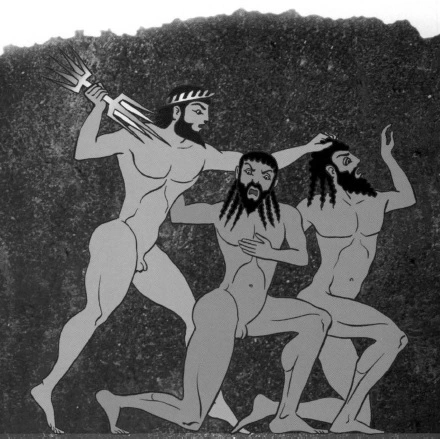Prometheus (Forethought) Greek One of the Titans, descended from the Earth Mother (Gaia) and the Sky Father (Uranus); son of Iapetus and one of the daughters of Oceanus, possibly Clymene; brother of Atlas and Epimetheus; father of Deucalion.
Publié le 26/01/2014

Extrait du document


«
knew he was being tricked, Zeus decided to keep the
knowledge of fire-making from humankind.
Prometheus, undaunted, stole fire from heaven,
or from the forge of the smith-god, Hephaestus, and
took it to Earth hidden in the hollow stalk of the fennel
plant.
He then began to teach people all the uses
of fire—how to make tools and fashion metal, how to
build, and how to cook.
He also taught people how to
sow and reap, and how to use herbs for healing.
Prometheus, Bound and Unbound - Mythology.
Prometheus,
the champion of humankind, had thwarted the
great god Zeus in his attempt to conceal knowledge
of fire from humans.
To punish the law-breaker, Zeus
chained Prometheus to a rock on Mount Caucasus,
where an eagle or a vulture plucked at his liver all
through the day.
Prometheus healed every night, so
this torture would go on through all eternity.
Eventually, the hero Heracles slew the bird and
unbound Prometheus.
The gentle centaur, Chiron,
Prometheus 121
The god Prometheus, chained to a rock by Zeus for giving fire to humans, suffers each day as an eagle plucks
at his liver.
Flemish artist Peter Paul Rubens (1577-1640) portrayed the scene in this oil painting which now
hangs in the Philadelphia Museum of Art.
122 Prometheus
then conferred his own immortality upon Prometheus,
so that he would die but Prometheus would live.
As well as being punished for bringing fire to
men, Zeus held Prometheus captive because he
knew a secret to which Zeus wanted an answer: The
sea nymph Thetis was soon to bear a child that
would be greater than its father.
The father could
be either Zeus or Poseidon; the child could cause
chaos among the Olympian Gods.
Prometheus
would not reveal his secret as long as he was held
captive.
Prometheus and Pandora - Mythology.
Prometheus was a
cause of great anger to Zeus.
Prometheus had tricked
Zeus in the matter of sacrifices made by humans and
he had eventually escaped from the terrible torture
inflicted by Zeus as punishment.
Zeus decided that
humankind must be punished for having received the
forbidden gift of fire.
Zeus ordered Hephaestus, the smith-god, to make
a woman out of clay.
The gods breathed life into her
and made her irresistibly beautiful.
She was named
Pandora (All-giving) and sent to Earth, bearing a
sealed vase, of which she was forbidden to know the
contents.
In spite of warnings from Prometheus,
Epimetheus, his brother, immediately took Pandora
to be his wife.
Then Pandora opened the vase,
sometimes called Pandora’s Box, and every disaster
that humans were ever to know was released upon
the world.
Only Hope remained in the vase, giving
humankind the will to go on living..
»
↓↓↓ APERÇU DU DOCUMENT ↓↓↓
Liens utiles
- Menoetius Greek A second-generation Titan; son of Iapetus and Clymene, who was a daughter of Oceanus; brother of Atlas, Prometheus, and Epimetheus.
- Oceanus Greek The Titan son of Gaia and Uranus and the brother and husband of the Titan Tethys; father of all the Oceanids and all the rivers and seas of the world.
- Hyperion (The One Above) Greek One of the Titans; son of Uranus and Gaia; father with Theia of Helios, Selene, and Eos (the Sun, the Moon, and Dawn).
- Phoebe (Bright) Greek A Titan, one of the daughters of Uranus and Gaia.
- Pleione Greek Daughter of the Titans Oceanus and Tethys; a nymph, one of the eldest among the thousands of daughters born of this union who were themselves considered by many writers to be Titans.







